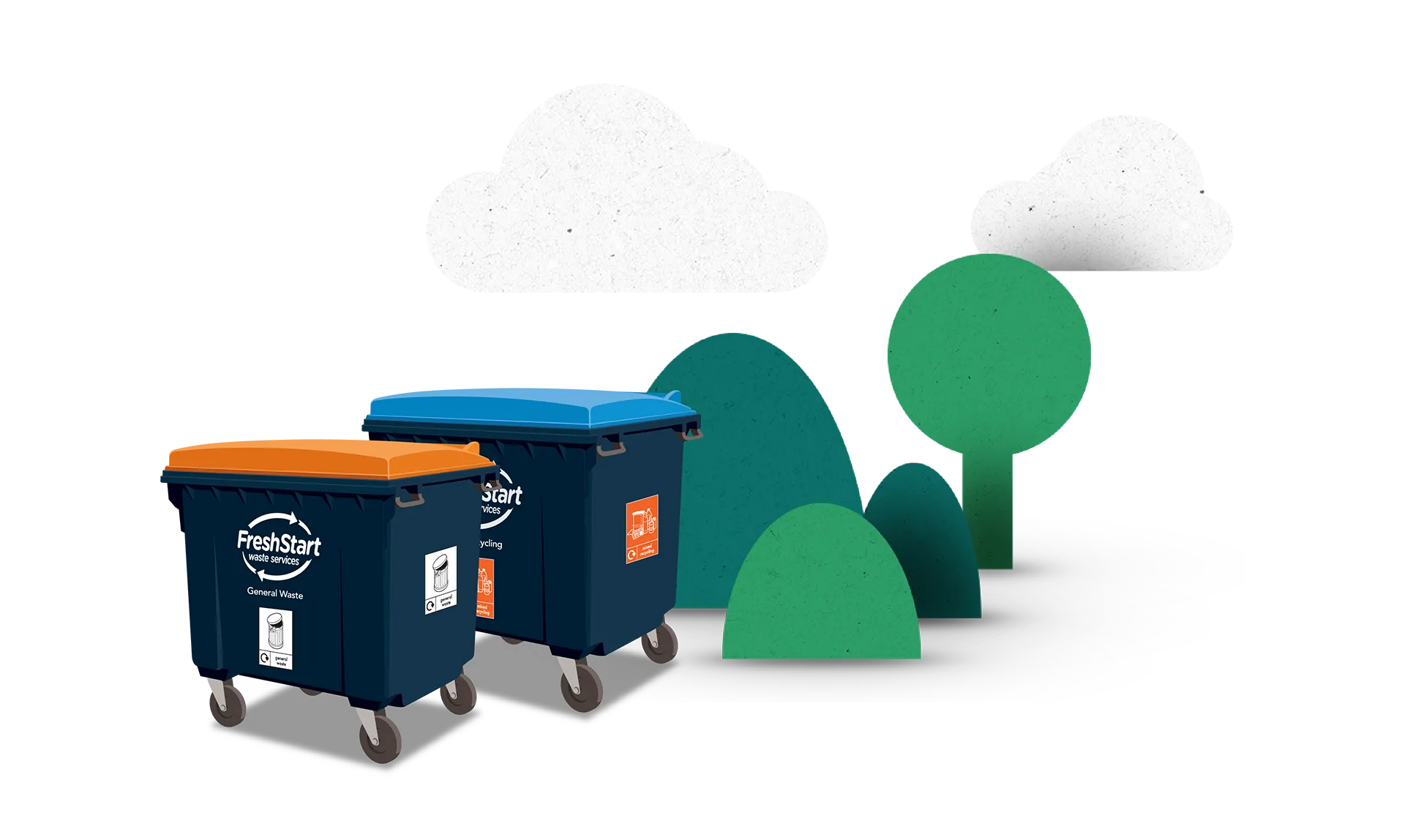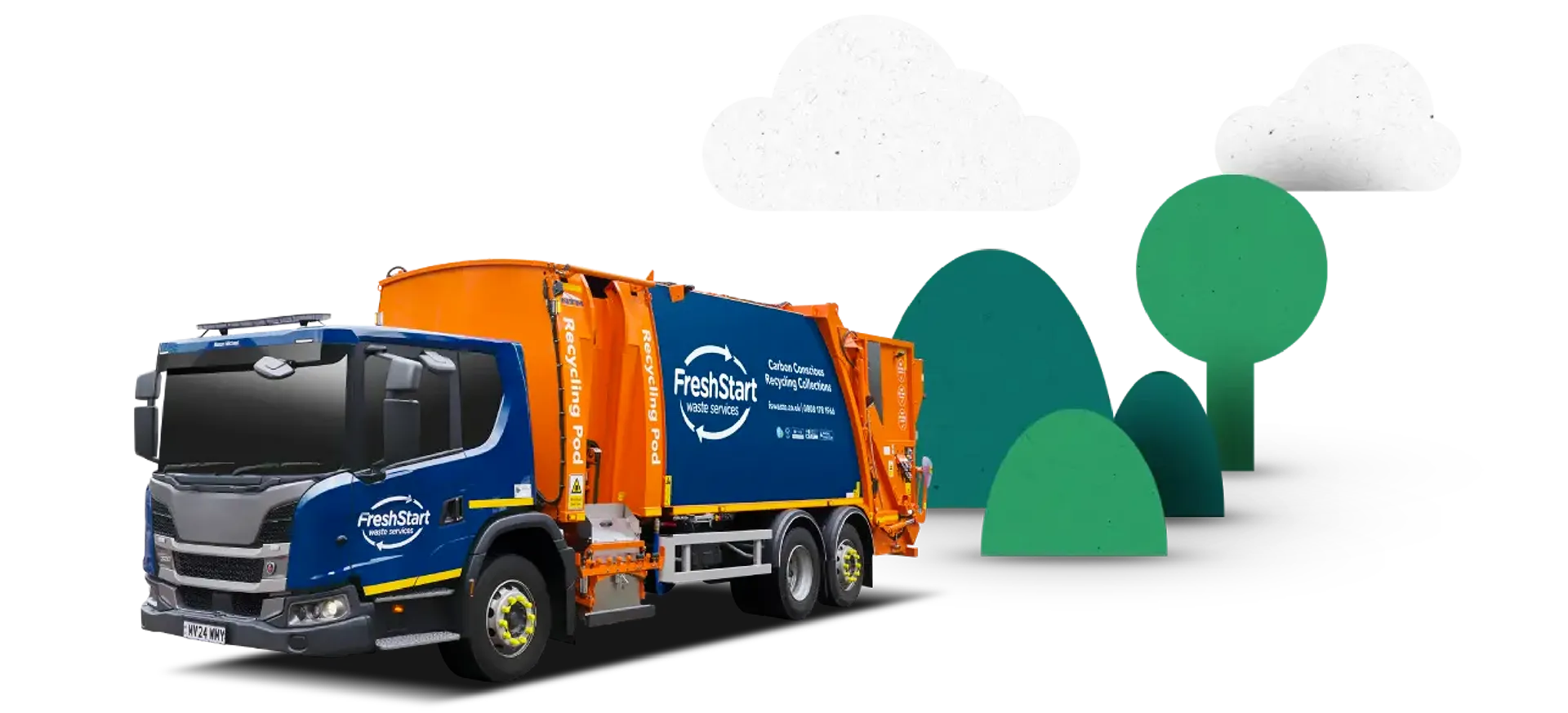Recycling Calculator - HTML
HTML for Identifying which kind of recycling bins a client would need to dispose of waste.
Simpler Recycling came into force on 31st March 2025. Make navigating this legislation simple with Fresh Start Waste.

Simpler Recycling law came into force 31st March 2025.
Simpler Recycling law was implemented on 31st March 2025. Businesses with over 10 employees must now segregate their waste at source so it can be more efficiently recycled.
The legislation is designed to streamline recycling processes, making it easier for businesses to comply with environmental regulations, while contributing to a more sustainable future.
It is crucial for businesses to understand the implications of this law, what they must do to ensure compliance, and how they can leverage the services of Fresh Start for faster, more efficient waste and recycling collections.
Under Defra Simpler Recycling plans, all businesses, schools, hospitals, and other ‘non-household municipal premises in England’ with more than 10 employees, must arrange collection for recycling or composting of the same recyclable waste streams as households. This excludes any garden waste.
Simpler Recycling legislation mandates a more straightforward classification and separation of waste, aimed at enhancing recycling rates and reducing landfill use.
For businesses, this means ensuring waste management practices and protocols align with this legislation. Fresh Start can help businesses with compliance and sustainability with our complete range of waste services.

Whatever your business, we offer sustainable waste management and recycling collection services across various towns and regions.
As a carbon-conscious company, the environment is at the core of everything we do. Being a widely trusted waste collector, we understand our responsibility to both our customers and the community to minimise our carbon footprint. That’s why we provide win-win solutions by encouraging customers to segregate waste at the source, rewarding these efforts with reduced waste disposal costs.
The size of your business will impact how you transition to Simpler Recycling.
Your business must segregate the following materials into appropriate containers to enable the recycling of valuable resources.
These materials are:
The government has put in place provisions for flexible collections with waste collectors in instances where it is economically, operationally and environmentally sound to do so. For example, collecting glass separately from other dry mixed recyclable materials (DMR), or, co-collecting paper and card with other DMR. By the 31st March 2027, recyclable plastic films must also be separated.
Although it’s best practice to implement segregated recycling, smaller businesses employing less than 10 people not yet subject to Simpler Recycling Laws. Full Simpler Recycling legislation will become law for these businesses in March 2027.
HTML for Identifying which kind of recycling bins a client would need to dispose of waste.
Submission for more Recycling information.
The main points to note under the Simpler Recycling scheme are:
If your business has 10 or more full-time employees, you’re now required to separate recyclable materials like paper, plastics, metals, and glass at the source.
Businesses are required to have enhanced documentation to track waste segregation and recycling rates.
We’ll conduct periodic waste audits to ensure compliance with regulations. Non-compliance could result in significant fines and reputational damage, making it essential for businesses to manage waste streams in accordance with the law.
We offer a comprehensive solution to help businesses navigate recycling laws. Our Simpler Recycling calculator above will show you in a few seconds what you’ll need for complete compliance. We offer a FREE Simpler Recycling consultation and full service recycling solutions that include:
With Fresh Start you get a free waste audit, analysing your current waste management practices and identifying areas for improvement. This audit is crucial in understanding the specific needs of your business and ensuring that you are managing waste in line with legislation.
Based on the audit findings, we’ll recommend and implement a waste and recycling collection service tailored to your business needs. This ensures that your waste management practices are not only compliant with Simpler Recycling, but are also optimised for environmental best practices.
All collected waste is taken to our state-of-the-art materials recovery facility. Here, waste undergoes further sorting to maximise recycling output. Advanced technologies are employed to ensure that as much waste as possible is diverted from landfills and recycled effectively.
One of the standout features of our service is our use of eco-friendly split body vehicles. These vehicles can collect multiple types of waste in a single trip, minimising the number of trucks required to visit each site. This not only reduces carbon emissions, but also streamlines the collection process.
To keep businesses informed of their environmental impact, we provide detailed monthly environmental reports. These reports include data on the amount of waste recycled, the reduction in landfill usage, and the carbon impact of your waste management practices. This transparency helps you monitor your progress and make informed decisions about further improvements.

Simpler Recycling is a government initiative to reform the way businesses approach recycling. It came into force on 31st March 2025.
It means that people across England will be able to recycle the same materials, whether at home, work or school.
With Simpler Recycling, DEFRA has aimed to make the process much clearer, so there is no confusion over what can and cannot be recycled.

The Government states that Simpler Recycling regulations aim to help with:

All businesses, schools, hospitals, and other non-domestic premises with 10 or more employees must comply with the Simpler Recycling regulations as of 31st March 2025.
Smaller companies, meaning those with less than ten employees have until 31st March 2027 to comply.

If your business has 10 or more employees you are now responsible for separating different types of waste for more efficient recycling.
To manage waste responsibly, businesses must use the right containers for different types of waste and arrange proper collection services with a licensed waste management provider.

Businesses should have already prepared for the new Simpler Recycling regulations and organised the following:

The new legislation for Simpler Recycling came into force on 31st March 2025 for most businesses and non-domestic premises.
For small businesses with less than 10 employees, Simpler Recycling will not start until March 2027.

Under Simpler Recycling regulations, businesses must now recycle the following products separately:

Most businesses will need three recycling bins to be compliant with Simpler Recycling rules:

The Simpler Recycling regulations state that separate recycling is required based on number of employees and does not specify a quantity.

Food waste must be collected and recycled separately. This came into effect on 31st March 2025..
Food waste cannot be mixed with general waste or other recyclables.

Businesses that fail to properly separate recyclables from general waste may face substantial fines.
It is important that businesses understand what the Simpler Recycling regulations require from them to ensure they are not penalised.

The Department for Environment, Food and Rural Affairs (DEFRA) keep their guidance updated on their website https://www.gwrwastemanagement.co.uk/defras-simpler-recycling-reforms-for-england
Alternatively, if you have any questions, you can contact our helpful team.

DEFRA stands for the Department for Environment, Food & Rural Affairs. It is a government department responsible for protecting the environment and promoting sustainable development.
DEFRA works to ensure that policies and practices related to sectors, such as agriculture, fisheries, food, and rural communities, are environmentally friendly and support the wellbeing of both people and the planet.
Through various initiatives and regulations, DEFRA plays an essential role in shaping the future of UK environmental and agricultural practices.

We provide a free waste audit, analysing your current waste management practices and identifying areas for improvement to ensure compliance. This audit is crucial in understanding the specific needs of your business and ensuring that you are fully prepared for the new regulations.